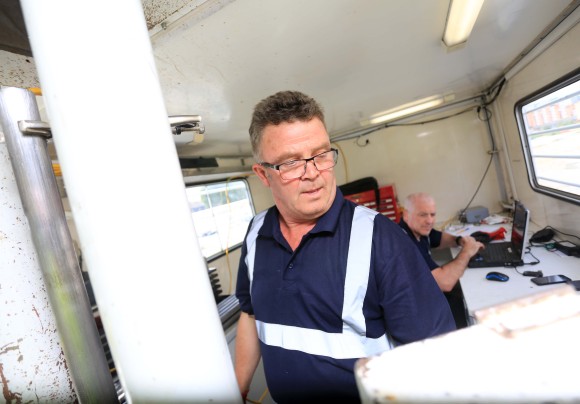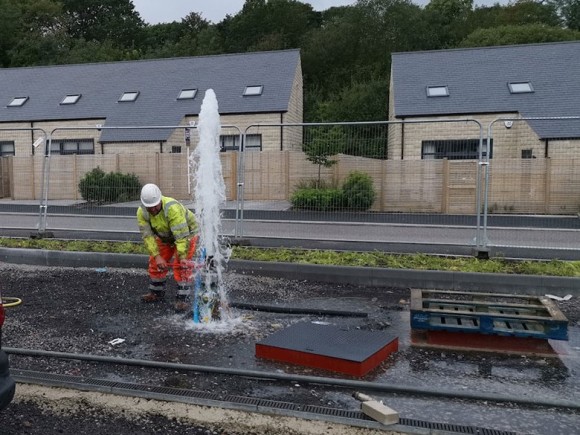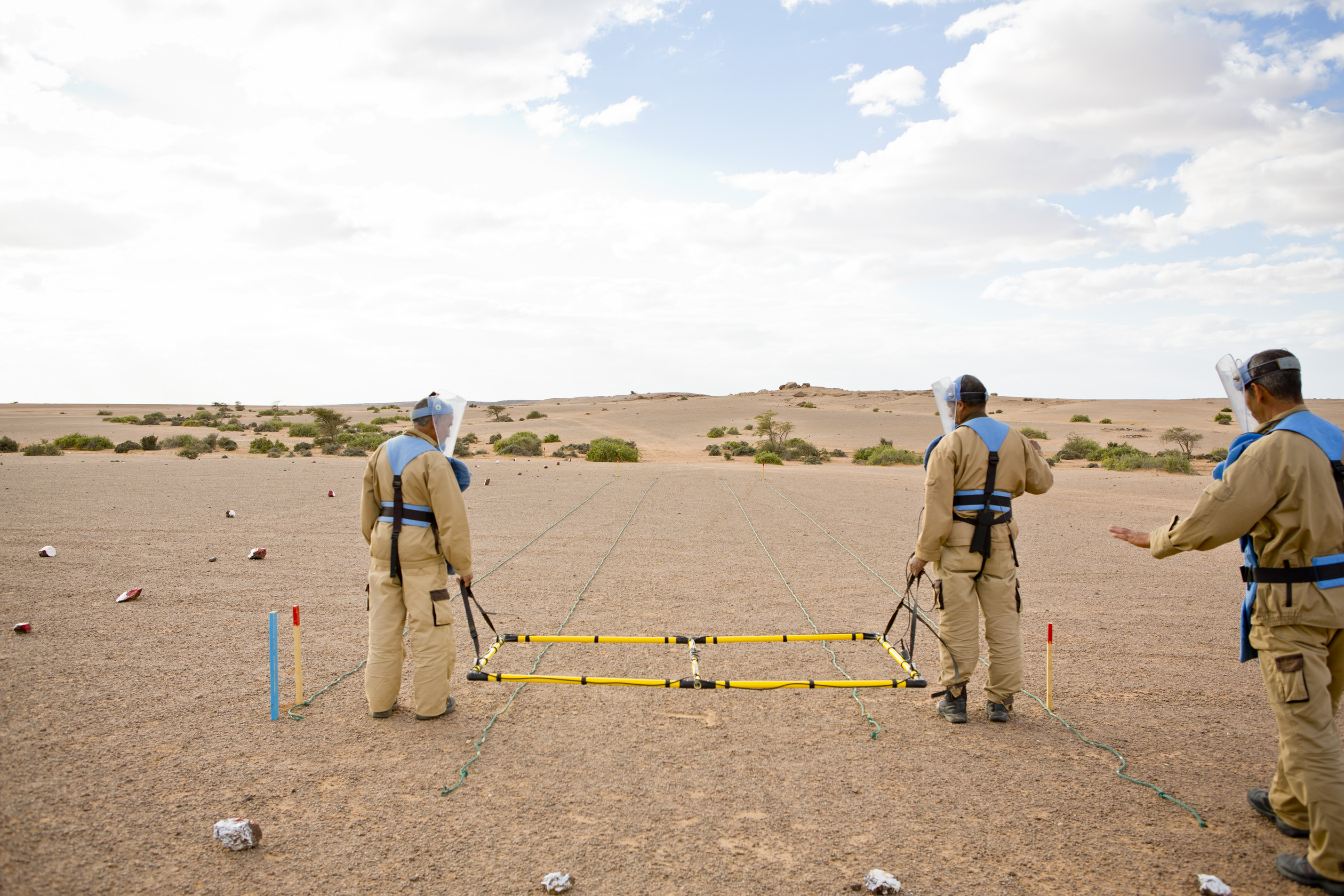Western Sahara community liaison ensures safe water access
Project Manager Tony Thompson explains how Community Liaison efforts help ensure areas surrounding water wells are safe from ERW.
ERW clearance challenges posed by Western Sahara’s desert environment
In Western Sahara, the austere desert conditions create unique operational challenges for Igne's clearance operations.
Key challenges include people not knowing where the demarcation lines of the buffer zones are, mine fields not being marked and there being no tarmacked roads. Due to the movement of sand, explosive remnants of war (ERW), including mines can become displaced or migrate and can be buried to far deeper depths than in other ground types.
Although this is a remote part of the world, there are still Bedouin communities and small villages in the area. ERW can have an impact on the safety of these communities as well as on the lives of those traveling through the region to the neighbouring countries of Algeria and Mauritania.
We have found that our community liaison efforts can help combat challenges that this environment presents, and they enable a people-first approach to our clearance prioritisation.
The benefits of a gender balanced community liaison capacity
Igne’s mine action project in Western Sahara employs a gender balanced community liaison team to ensure all community members are comfortable to engage in conversations regarding the threat of ERW and mines.
Sometimes male community members are away - perhaps working with their livestock such as camels and goats - and the presence of our female liaison officers helps to ensure ours is an approachable liaison capacity for the women and children who remain behind in the communal settlements.
The community liaison team always introduces themselves and they explain the purpose of the presence of Igne operations close by. We typically find the communities in Western Sahara are incredibly welcoming and happy to engage with us, which is a real pleasure.
When we get to speak to community members, these liaison activities serve as an essential reminder to us all of just how critical our clearance work is for those whose everyday lives are restricted by explosive threats.
The liaison team has the requisite knowledge, due to their mine action backgrounds, to encourage and enable conversations about any unusual items the community may be aware of in the vicinity. Identifying that someone may have seen an unusual item helps prioritise surveying and clearance tasks.
Prioritising clearance of explosive remnants of war around wells - ensuring safe access to water
Bedouin communities follow vegetation and the rains, meaning they may move on prior to us completing surveying and completion of a task. During their travels, they utilise permanent wells for their water supplies. This is an essential asset for people and their livestock in Western Sahara.
Our community liaison teams ensure they learn the location of all these wells. This enables us to prioritise clearance around critical water suppliers, and ensures we’re doing everything we can to protect communities and their livelihoods from explosive remnants of war.
In prioritising the clearance of these areas first, we ensure our operations are people-centric. It’s rewarding to know we’re helping to ensure these wells are safe for everyone.
A bit more about Tony Thompson…
Tony joined the British Royal Navy as a clearance diver and spent nine years working in bomb and mine disposal.
After pursuing a career as a commercial air and saturation diver, Tony decided to change his career and began work in humanitarian mine action. Now, Tony has nearly 30 years of experience working in a variety of positions within the sector.
As someone who cares so deeply about the importance of mine clearance, we are honoured to have him providing project management for Igne in Western Sahara; Tony brings a wealth of experience and passion for the positive impact mine action has.
You can Tony's case study here.
ERW clearance challenges posed by Western Sahara’s desert environment
In Western Sahara, the austere desert conditions create unique operational challenges for our clearance operations.
Key challenges include people not knowing where the demarcation lines of the buffer zones are, mine fields not being marked and there being no tarmacked roads. Due to the movement of sand, ERW, including mines can become displaced or migrate and can be buried to far deeper depths than in other ground types.
Although this is a remote part of the world, there are still Bedouin communities and small villages in the area. ERW can have an impact on the safety of these communities as well as on the lives of those traveling through the region to the neighbouring countries of Algeria and Mauritania.
We have found that our Community Liaison efforts can help combat challenges that this environment presents, and they enable a people-first approach to our clearance prioritisation.
The benefits of a gender balanced Community Liaison capacity
Igne’s mine action project in Western Sahara employs a gender balanced Community Liaison team to ensure all community members are comfortable to engage in conversations regarding the threat of ERW and mines.
Sometimes male community members are away - perhaps working with their livestock such as camels and goats - and the presence of our female Liaison Officers help to ensure ours is an approachable liaison capacity for the women and children who remain behind in the communal settlements.
The Community Liaison team always introduces themselves and they explain the purpose of the presence of Igne operations close by. We typically find the communities in Western Sahara are incredibly welcoming and happy to engage with us, which is a real pleasure.
When we get to speak to community members, these liaison activities serve as an essential reminder to us all of just how critical our clearance work is for those whose everyday lives are restricted by explosive threats.
The Liaison team have the requisite knowledge, due to their mine action backgrounds, to encourage and enable conversations about any unusual items the community may be aware of in the vicinity. Identifying that someone may have seen an unusual item helps prioritise surveying and clearance tasks.
Prioritising clearance of ERW around wells - ensuring safe access to water
Bedouin communities follow vegetation and the rains, meaning they may move on prior to us completing surveying and completion of a task. During their travels, they utilise permanent wells for their water supplies. This is an essential asset for people and their livestock in Western Sahara.
Our Community Liaison team aims to learn the location of all these wells. This enables us to prioritise clearance around critical water suppliers, and ensures we’re doing everything we can to protect communities and their livelihoods from explosive remnants of war.
In clearing these areas, we ensure our operations have a people-first approach as we enable the safe collection of water. It’s rewarding to know we’re helping to ensure these wells are safe for everyone.
A bit more about Tony…
Tony joined the British Royal Navy as a clearance diver and spent nine years working in bomb and mine disposal.
After pursuing a career as a commercial air and saturation diver, Tony decided to change his career and began work in humanitarian mine action. Now, Tony has nearly 30 years of experience working in a variety of positions within the sector. Caring deeply about the importance of mine clearance, the team are honoured to have him providing project management in Western Sahara, he brings with him a wealth of experience and passion for the positive impact mine action has.
You can read more about Tony here.
Other articles of interest

UXO clearance for UK constructor
Igne was commissioned to provide unexploded ordnance clearance ahead of piling works for the construction of a large housing project in Enfield, London, UK.

Capping artesian pressure
Igne’s borehole experts responded to an emergency callout from a construction client whose site was flooding because of a free flowing artesian well.


